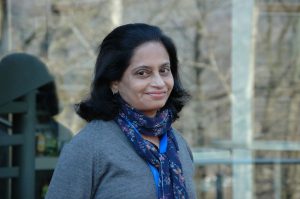Against the odds: Indian science and science journalism (plus video)
T.V. Padma (Delhi / India), science journalist and HITS Journalist in Residence 2017, will speak about the challenges and chances for scientists and journalists in the most populous democracy. Public talk on May 10, 2017, in the Studio Villa Bosch in Heidelberg. (See the video of the talk below)
As a rapidly growing economy, India is attracting global attention, both for its market opportunities and growing knowledge base. Since the dawn of Independence, successive governments have emphasized science as the key to the country’s progress. The country has a mixed science bag: on the one hand, India is recognized today for its achievements in space, biotechnology, information technology, engineering, chemistry and nanotechnology, while its ambitious solar power program has caught the world’s attention. On the other hand, the country continues to struggle with high maternal and infant death rates; tuberculosis burden; mosquito-borne infections of malaria and dengue; sanitation and drinking water problems.
In a HITS colloquium talk at the Studio Villa Bosch in Heidelberg, Indian science journalist T.V. Padma explains to what extent science is covered in India today, and how journalist balance the various perspectives – from the curiosity and excitement of basic science to the pragmatism of applied science; from the research policy focus and priorities to the role of science and science communication of the country’s development narrative? Some of their problems are common to science journalists worldwide; others have a more specific context.
T.V. Padma earned a B.Sc. in Botany (Honours) and an M.Sc. from the University of Delhi, where she undertook special courses on genetics and microbiology. She was awarded the National Science Scholarship for post-graduation studies and also has a post-graduate diploma in bioethics. Padma writed for Nature, Nature India, New Scientist, Physics World, BioWorld, and other outlets. Before, she was a science correspondent at India’s leading news wire agency, Press Trust of India (PTI), covering space, nuclear energy, medicine, the environment, and crop research. From 2004 to 2014, she served as the first South Asian news editor/regional head of SciDev.Net, a not-for-profit, free-access international science website that focuses on science policies and research in developing countries. Since February 2017, T.V. Padma is the 6th “Journalist in Residence” at HITS.
More about the “Journalist in Residence program.
About HITS
HITS, the Heidelberg Institute for Theoretical Studies, was established in 2010 by physicist and SAP co-founder Klaus Tschira (1940-2015) and the Klaus Tschira Foundation as a private, non-profit research institute. HITS conducts basic research in the natural, mathematical, and computer sciences. Major research directions include complex simulations across scales, making sense of data, and enabling science via computational research. Application areas range from molecular biology to astrophysics. An essential characteristic of the Institute is interdisciplinarity, implemented in numerous cross-group and cross-disciplinary projects. The base funding of HITS is provided by the Klaus Tschira Foundation.

